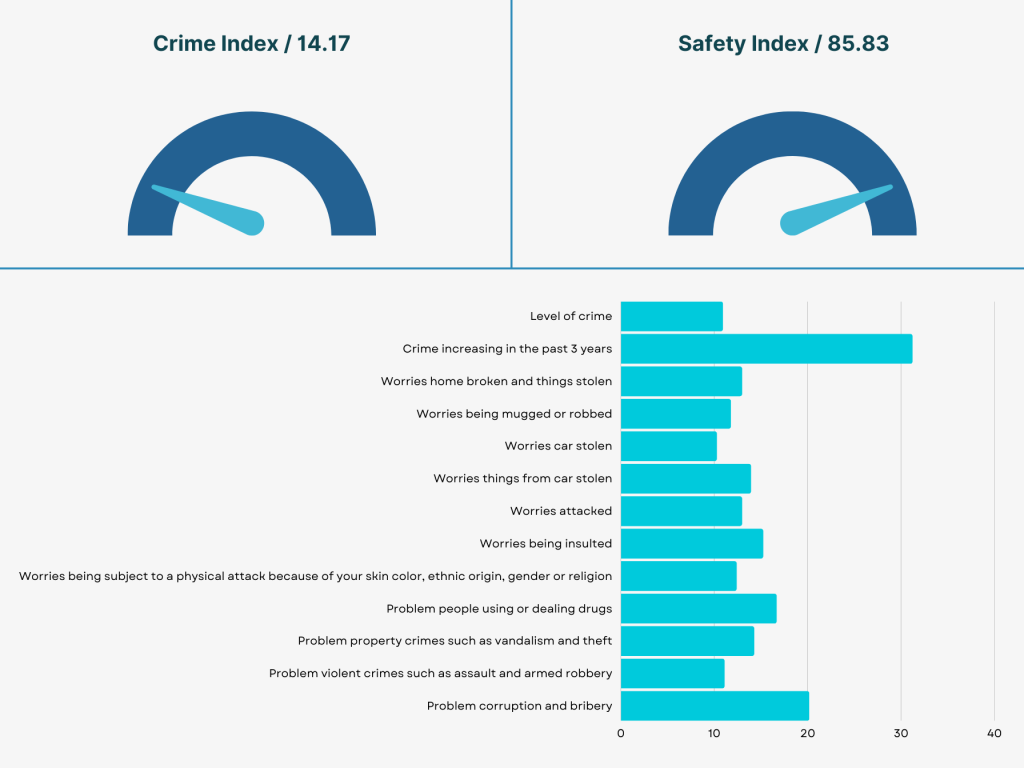When it comes to the United Arab Emirates (UAE), you may find yourself wondering, “Is the UAE a safe country?” The public’s diverse views of the Emirates are often influenced by hearsay, cultural stereotypes, and exposure to media coverage, and among the subjects that commonly come to mind is the matter of safety. However, what some might not be aware of is that the UAE is distinguished for something less apparent but equally significant: its reputation as one of the safest places in the world to live. In fact, based on InterNations’ Expat Insider Report 2023, the UAE ranks third among the most popular countries where expats choose to reside.
Safety rankings and statistics
According to Numbeo’s 2023 Safety Index, the UAE is ranked as the second safest country out of 163 nations. Three emirates rank among the top 10 safest cities globally, with Abu Dhabi securing the top position, Ajman following closely in second place, and Dubai claiming the fifth spot. In terms of security and personal safety assessments, 93.5% of Abu Dhabi residents stated that they experience a sense of safety while walking alone at night. According to a recent report from the Department of Community Development, this percentage exceeds not only the 93% recorded rate in 2020 but also surpasses the safety levels reported in all OECD countries.
Furthermore, the UAE boasts an impressively low crime rate, with a score of 14.7 on a 100-point scale. Crimes such as theft, robbery, and assault are rare occurrences. Law enforcement agencies are highly vigilant and proactive in preventing and combating crime. The following chart provides the most recent data for October 2023, illustrating the low crime rate in the country.
 Data from: Numbeo
Data from: Numbeo
Initiatives and safety measures in place
Several factors contribute to the UAE’s reputation for safety. Safety measures include regular police patrols, stringent immigration policies, and a robust emergency response system. The government follows a zero-tolerance policy towards crime, ensuring that offenders face strict consequences. The incorporation of emerging technologies has significantly bolstered the country’s security and safety measures. Law enforcement is driven by state-of-the-art technology and the utilization of artificial intelligence. CCTV cameras are strategically placed throughout the country, ensuring that public spaces are closely monitored. Another emerging technology that has become increasingly prevalent is the use of unmanned aerial vehicles (UAVs), often referred to as drones, to enhance the surveillance and protection of local communities.
With people from diverse cultural backgrounds coexisting harmoniously, the government promotes tolerance and understanding. This multicultural environment fosters a sense of security, as people feel respected and accepted. Federal Decree Law No. 2 of 2015 on Combating Discrimination and Hatred, prohibits any actions that propagate religious animosity through various means of communication. This legislation renders it unlawful to engage in discriminatory practices against individuals or groups based on factors such as religion, caste, belief, race, color, or ethnic heritage. Those found in violation of this law may face penalties that encompass imprisonment and financial fines.
With the increasing prevalence of online threats, the authorities have taken proactive steps to safeguard its digital infrastructure. The legal framework safeguarding against cybersecurity crimes is established by Federal Decree Law No. 34 of 2021 on Combatting Rumours and Cybercrimes. This law is intended to elevate the level of defense against online criminal activities carried out through information technology, networks, and digital platforms. Cybersecurity measures are continuously updated and improved to protect individuals and businesses from cybercrime.
The country attains an impressive community safety score of 98.5 percent, reflecting a high level of security and safety for women. These findings stem from a comprehensive report conducted by the Georgetown Institute for Women, Peace, and Security. Women feel more secure when walking alone at night or using public transportation. The government has implemented women-only transportation options, such as exclusive taxis for ladies and families and Dubai Metro’s dedicated carriages for women and children.
Furthermore, there is a strong emphasis on safeguarding borders and protecting citizens from terrorism threats. The government allocates substantial resources to invest in cutting-edge border security technologies and well-trained personnel who diligently monitor and manage the flow of individuals and goods entering the nation. Stringent immigration and visa regulations are enforced to prevent the entry of individuals with potential ties to terrorism. It is also actively engaged in countering extremist propaganda on digital platforms and conducts extensive awareness and educational campaigns to deter radicalization within its population. Additionally, the country has implemented rigorous measures to combat money laundering, crucial in preventing the financing of terrorist activities, governed by Federal Decree-law No. (20) of 2018 on Anti-Money Laundering and Combating the Financing of Terrorism and Financing of Illegal Organizations.
In conclusion, the UAE has indeed earned its well-deserved reputation as one of the safest places to reside. Its impressive track record includes a consistently low crime rate and a strong commitment to implementing and enhancing safety measures. The government’s proactive initiatives underscore its dedication to fostering a secure environment for all residents and visitors alike. Despite the country’s exceptional safety standards, it’s always wise to exercise personal safety precautions, as one would in any location worldwide. So, the next time you find yourself pondering, “Is the UAE a safe country?”, rest assured that the answer is a resounding yes.
Download the article here.